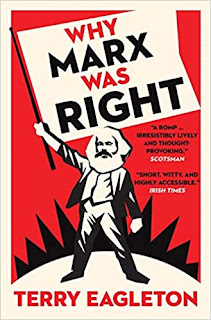Life After Christianity: An Eschatological Reflection in the Spirit of Terry Eagleton
That Marxism is finished would be music to the ears of Marxists everywhere. They could pack in their marching and picketing, return to the bosom of their grieving families and enjoy an evening at home instead of yet another tedious committee meeting. Marxists want nothing more than to stop being Marxists. In this respect, being a Marxist is nothing like being a Buddhist or a billionaire. It is more like being a medic. Medics are perverse, self-thwarting creatures who do themselves out of a job by curing patients who then no longer need them. The task of political radicals, similarly, is to get to the point where they would no longer be necessary because their goals would have been accomplished. They would then be free to bow out, burn their Guevara posters, take up that long-neglected cello again and talk about something more intriguing than the Asiatic mode of production. If there are still Marxists or feminists around in twenty years’ time, it will be a sorry prospect. Marxism is meant to be a strictly provisional affair, which is why anyone who invests the whole of their identity in it has missed the point. That there is a life after Marxism is the whole point of Marxism.[*]
When I first came across these words, sometime between university and seminary, I was stopped in my tracks. I don’t know why. Perhaps it was because I was so used to the language of die-hard Marxists scattered across various leftist Facebook pages I was a member of; maybe it was because, in higher theological education, people are willing to sacrifice themselves on the altar of their own theological viewpoints. But there was something refreshing about Eagleton, a world-renowned Marxist, desperately longing for a day when Marxism would vanish from the face of the earth.
That being said, it made me reexamine my own convictions, religious or otherwise. What was the point? What was the point of Christianity? Was it merely to skew humanity’s ethics toward the poor and oppressed? Was it to get people into heaven? Was it to dominate the world until we effectively convert or rid the earth of any and all non-Christians? As I considered the countless answers to the question of Christianity’s purpose and final telos, I found myself coming back to Eagleton’s poetic yearning above and using it to make sense of my own eschatological understanding:
That Christianity is finished would be music to the ears of Christians everywhere. We could pack in our preaching and bible studies, our community organization and church leadership meetings and return to our spouses, children, and loved ones to enjoy an evening at home. We should want nothing more than for all the religious towers of babel to come crashing down, including our own. We should strive, not to get people into heaven, but to get heaven into the earth. We should strive, like our Marxist friends, to work ourselves out of a job. If we do that, then there’s only one thing that would mean: that at last, God is finally all-in-all.
It would mean that meaninglessness and futility would be gone; that all would be provided for; that dignity would finally be bestowed upon each and every human being, not because they have something to offer or because of the amount of value they add to a capitalist enterprise, but merely because they exist. It would mean that there would be no more religious division, no more Christians or Muslims or Buddhists or Atheists; there would only be the finality of creation and nothing else.
We would be free to pack away our commentaries and theological systems and dust off that old novel we put down years ago. We would be free to gather together and discuss something more interesting and relevant than the trajectory of the doctrine of revelation in 17th century theology. If there are still Christians around in twenty years’ time, it will be a sorry prospect. Christians should want nothing more than to stop being Christians; than for Christianity to be a provisional affair.
That there is a life after Christianity is the whole point of Christianity.
[*]Terry Eagleton, Why Marx Was Right, (New Haven, CT: Yale University Press, 2011) 1-2.
==================================
Follow J.T. Young
Subscribe to Die Evangelischen Theologen



Comments